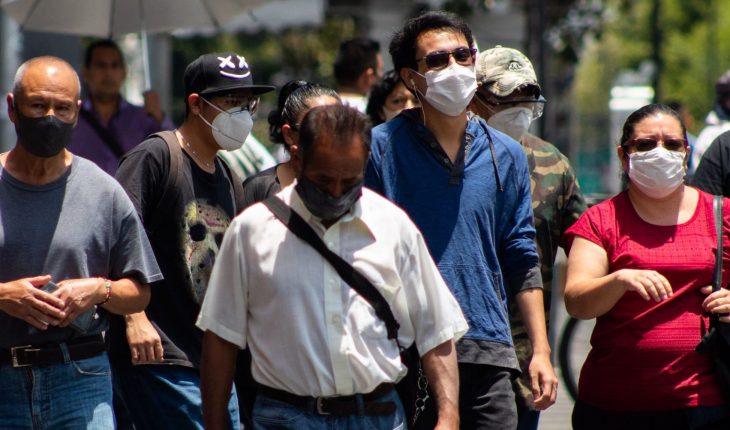Employees of the Federation’s Higher Audit (ASF) report that they have been forced by their direct bosses to go to offices, even though they can carry out their duties remotely, resulting in the contagion of COVID among their peers and even incessants.
While during May, when Mexico City was at red light, officials worked from home, they began their return last July with reduced hours of 10am to 5pm with no meal time but just a ‘snack’ in their places, alternating one week’s face-to-face work, and another, remotely, but in practice it has not been respected Ensure.
You may be interested: From SRE employees to immigrants: more than 300 consulate workers on the brink of dismissal
In addition, while only half of the staff would go each week, there are a total of 3,500 employees in the Ajusco building, which means that more than 700 people live in offices, elevators, institutional transport or public transport.
Animal Político also obtained a recording in which the special auditor, Gerardo Lozano explained how they would resume work in the offices, because “we all have to go back. We all have to join this new normal.” While his assistant, Carlota Barroso, topped off, “we are hired for face-to-face work.”
Meanwhile, in the manual “Measures for the safety of staff in the ASF, arising from the health emergency caused by the SARS-COV2 virus”, they state that those working remotely will be with the authorization of their hierarchical superior and “must be carried out in the same official days and hours and remain geolocated during their working day, and it is necessary that the number of days on which they carry out activities in this modality , may not be longer than three working days.”
Audit workers agreed to speak to Animal Politics on the condition of safeguarding their identity for fear of reprisals, as in all cases they are staff with no management charge and years old, so the names for the publication were changed.
John warns that he has learned firsthand of almost 30 colleagues infected in what goes from the pandemic, and although effectively during the return they implemented an alternating work strategy, from November “they gave the instruction to work at normal times and we began to attend every day”.
“This caused many people to take their hour and a half of food and therefore gather in groups to eat as before. In addition to the use of elevators and bathrooms,” he says in interview.
While staff with some comorability are working at home, Francisco says that many of the activities they perform in his work area could be considered administrative, and “it’s not a priority activity or that he necessarily forces us to be in the office,” but that it has cost his peers his lives.
However, the Directorate-General for the Dissemination of audits replied that “work at home has been privileged” and only in priority areas implemented alternating measures and also maintain access control, sanitization of areas when some confirmation of contagion occurs, and even the purchase of protective suits for use in out-of-office proceedings when necessary.
“Our level of contagion is very low, it doesn’t reach even 1%. And inside the institution there are no complaints, and protocols are constantly reviewed. The people here are safer than in their homes,” the ASF said.
However, Maria, another of the employees explains that the order to attend offices depends on each director, that is, it is completely discretionary because there is no written order from Human Resources. In their area, even colleagues have had to go to work even when they have symptoms because in that case they are required to have a PCR test to confirm or rule out the contagion. This, he says, makes them prefer to hide some discomfort in some cases because the payment of 3 thousand or 4 grand per test is not within their reach.
Juan, who belongs to another area, also agrees: “The idea was that if we present symptoms we stay home, but if you stay at home they ask you to go to the doctor (even if it is only a headache) to be justified on the day, otherwise they neglect it, and to return the negative test is necessary. So a lot of people prefer to hang on.”
Martha, another of the interviewed employees, adds that the problem is like a “snowball because those who either don’t trust the staff, who can actually work at home, or don’t know how to use the tools for remote work,” resulting in contagions, which in their case, have been 10 colleagues.
Read more: #SemáforoEconómico: this is how the pandemic impacted job creation in 2020
Employees who come to the building on Coyoacán Avenue, warn the same problem, especially because they say, they do not even need to consult documentation in the office, because the documents are uploaded to the cloud and the trades that arrive in physical are scanned so that everyone can access them.
While the Audit must deliver the next package of individual audit reports next February and that puts pressure on its work, they insist that they can comply from home.
Although the Public Service Secretariat issued a new guideline for extending remote work until April 30 of this year, it only applies to the Executive, but the ASF depends on the Legislative, so “we are in limbo,” Francisco laments.
What we do at Animal Politics requires professional journalists, teamwork, dialogue with readers and something very important: independence. You can help us keep going. Be part of the team.
Subscribe to Animal Politics, receive benefits and support free journalism.#YoSoyAnimal
translated from Spanish: ASF employees report COVID cases for forcing them to go to offices
January 18, 2021 |





